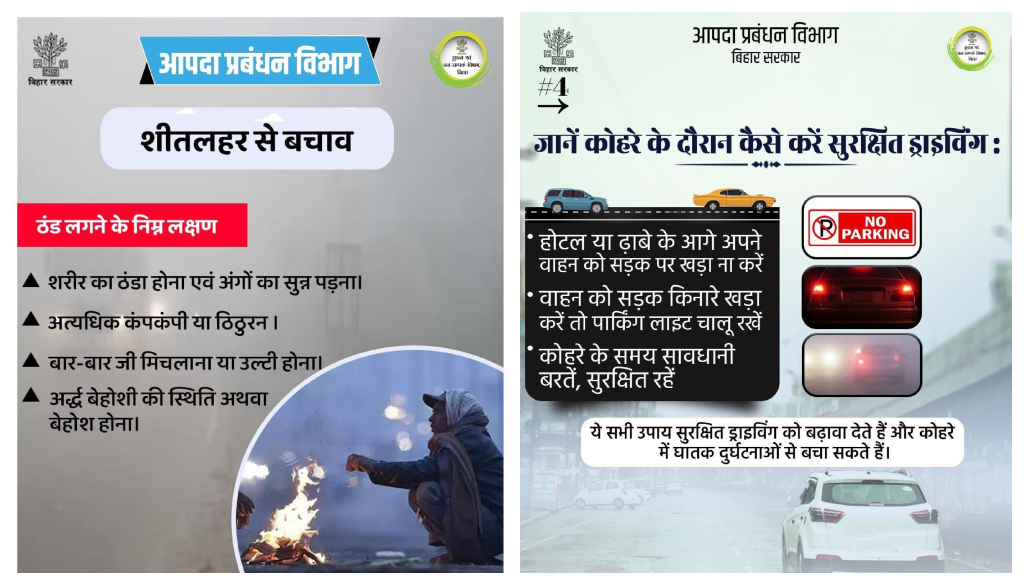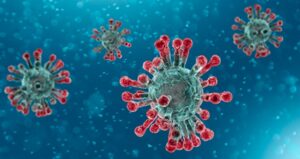Cold Wave Preparedness: Essential Tips for Safety, Agriculture, and Livestock Care

Patna: As the threat of cold waves looms, the District Magistrate’s Office in Patna has issued crucial guidelines to ensure safety during harsh winter conditions. The advisory covers everything from personal protection to the care of crops and livestock, urging residents to take preventive measures ahead of the cold.
Personal Protection: How to Stay Safe During the Cold
Residents are advised to stay updated with local weather forecasts through TV, radio, or newspapers, as cold waves can cause severe health risks. Stocking up on winter essentials such as layered clothing, food, water, and emergency supplies is a key preventative measure. Health professionals emphasize the importance of wearing multiple layers to trap body heat and prevent frostbite, particularly covering sensitive areas like the head, hands, and toes.
The advisory also stresses the need to stay indoors as much as possible during cold spells and minimize exposure to wind, snow, and rain. Those who must venture out are urged to wear windproof and insulated clothing, including hats, scarves, and mittens to maintain body warmth.
In addition to clothing, nutrition plays a vital role. Foods rich in Vitamin C, regular consumption of hot drinks, and moisturizing the skin with oils and creams are encouraged. Vulnerable groups—elderly people, children, and those with pre-existing health conditions—should be monitored closely.
For households, the advisory also warns against the use of coal for indoor heating without proper ventilation, citing the risks of carbon monoxide poisoning. Instead, room heaters should be used with care, ensuring adequate airflow to avoid suffocation.
If frostbite or hypothermia occurs, seeking medical attention immediately is paramount. Early signs like numbness, stiff skin, or difficulty speaking should not be ignored. Medical experts recommend lukewarm water for treating frostbitten limbs and immediate relocation to a warm environment to prevent further damage.
Agriculture: Protecting Crops from the Cold
Farmers are facing increased risks as cold waves can severely impact crop health, particularly during germination and flowering. Cold-induced damage can weaken crops, making them more susceptible to diseases and pests.
To mitigate the effects, experts recommend the use of Bordeaux mixture or copper oxychloride to prevent fungal infections after a cold spell. Additionally, phosphorus and potassium fertilizers can help rejuvenate crops and promote root growth. Artificial lighting and irrigation systems are also advised to maintain warmth around plants and protect them from frost.
For farmers looking to reduce exposure to cold winds, intercropping with taller plants like mustard or peas provides natural shelter. Similarly, covering soil near plant stems with plastic sheets or organic materials like straw can help retain heat and protect roots from freezing.
Lastly, the installation of windbreaks such as hedges or smoke barriers in the garden can further shield crops from the cold.
Livestock: Ensuring Animal Welfare in Freezing Temperatures
As the temperature drops, livestock care becomes critical. Animals require more energy during cold spells, and fluctuations in temperature can affect their reproductive health.
Farmers are advised to insulate animal shelters, ensuring they are fully covered to prevent cold winds from reaching the animals. Small animals should also be kept covered, and dairy cattle and poultry should be housed indoors to safeguard against frostbite.
High-quality fodder and fatty feed are essential to meet the increased nutritional needs of livestock. Monitoring their eating habits and adjusting feed quantities is crucial for maintaining animal health during the winter months. Additionally, farmers are encouraged to select climate-appropriate breeds suited to the local weather conditions.








